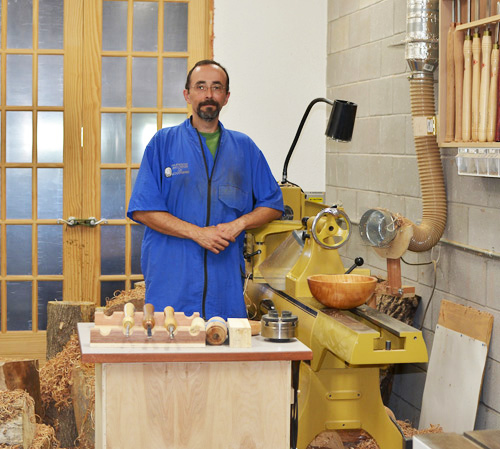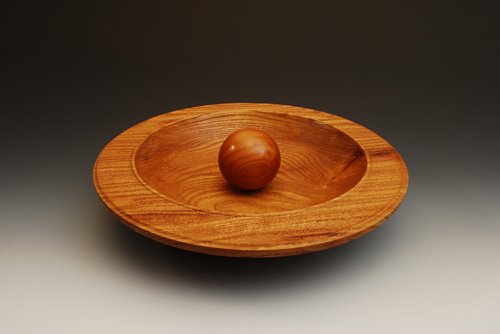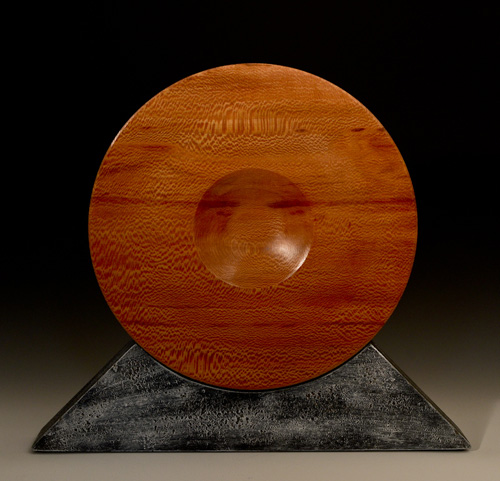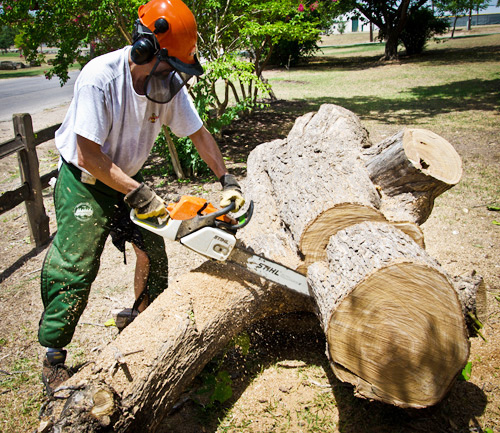Jumpstart Your Turning Skills with a Class
by Curtis Turner
Round Rock, TX

|
Curtis in his studio with a large Pear bowl.
|
Highland Hardware is pleased to introduce you to Curtis Turner, our newest contributing writer to
The Highland Woodturner. Even though he has been a "Turner" his entire life, he knew turning was
a skill that required the guidance of a master to develop it fully. He worked closely with an
experienced turner, who helped him train his eye (and hand) to blend curves, develop pleasing forms
and sharpen tools efficiently. The guidance he received in his early days of turning has convinced
him that success in woodworking credits back to both formal instruction and membership in a
community of woodworkers.
I discovered early in life that I enjoyed working with wood. I can trace my interest in building
and crafting items to my early childhood. I still have the first tool box I made, at age 10, from
scraps. I spent much of my youth exploring nature, and building a variety of things, from fishing
tackle to a shoji screen.

|
Ash platter with textured rim
about 10” in diameter with
a turned Cherry ball.
|
As a scuba instructor and dive guide during the late 1980's, I shared with others my joy of
diving and the fascinating exploration of nature. It is through this early training I observed the
value of professional instruction. The training I completed helped me to advance in my skills, and
I learned how to teach others effectively. My enjoyment of teaching continued to evolve during my
professional years, and continues today in all aspects of woodworking. There is something almost
magical about helping someone conquer a technique. The students' excitement, and sharing their
sense of accomplishment, is very gratifying. And I find introducing others to the hidden beauty of
woodworking enhances my own enjoyment of the craft.

|
Locally harvested Sycamore
disk about 10” in diameter.
|
I began seriously working with wood in 2000, after retiring from a successful career in the high
tech industry. My work began with a focus on furniture, but evolved to include carving and turning.
In 2005, I made my first lathe purchase, perhaps a bit impulsively, after attending a turning demo
at a local woodworking store. However, once I stood before my shining new lathe, my confidence was
not so strong. I knew that a novice wielding sharp tools at spinning wood was risky, and such
skills were best learned with the guidance of an experienced hand.
Instruction smoothes the learning curve
I contacted the Austin turning club for a reference for a qualified instructor. I was soon
taking classes and well on my way to safely and rapidly advancing my skills. My instructor was
quick to put a skew in my hand and said, "You need to master this tool." He explained how,
although a challenging tool, it is perfect for many spindle operations. I took his words to heart
and spent many hours practicing with the skew. Today, I will pick up a skew without a second
thought.

|
Curtis harvesting a Catalpa tree
that needed to be removed by
a local forestry department.
|
I firmly believe that turning is a skill best approached with an instructor. There are so many
tips, tricks and techniques one can learn after just a few hours' investment of time. Certainly
these same skills might be learned accidentally or slowly, over the course of many years of turning.
However, why not save time and start taking advantage of these advanced skills now? An experienced
turner can help guide you through many aspects that are not otherwise apparent in books or videos.
For example, books can't teach the fluidity of one's body movement. The hand pressure and control
at the grinding wheel is not always apparent in videos. The fundamental skills are critical to
long-term turning enjoyment. An instructor can make simple suggestions or corrections to improve
technique, ensuring a safe and productive time at the lathe.
An instructor will be able to help guide you to smart, cost-effective tool purchases. A good
instructor will be willing to share their mistakes and successes, to help you get the most out of
your time and money. An instructor will be willing to explain why a particular tool makes sense for
your needs, or if it is not needed for a particular project. The money saved by avoiding a bad
purchase, may, itself, make the cost of the class or instruction time worthwhile.
Turning clubs are a resource
Turning clubs are another great resource for learning from other turners. Experienced turners
are generally willing to share their knowledge with those that are willing to ask. I would
encourage turners of every skill level to search out a local club. You can find local chapters via
the American Association of Woodturners at
www.woodturner.org. Most turning clubs include members
from the very beginner up to professional turners.
Clubs often have a structured demonstration at their monthly meeting. Demonstrations are an
excellent way to watch how the demonstrator performs a technique, or how he or she completes a
particular project. It is also a valuable opportunity to ask questions.
Club members generally bring in finished turnings to display during the meeting. They can run
from a simple bowl to amazing works of art. Sometimes the most beneficial time of the meeting for
me is the opportunity to talk to the turner who created the work. Recently, during our club's
instant gallery, I admired a platter that had an unusual texture. The turner explained what he used
to create the texture and the name of the specialty supplier for the tool.
Clubs can also be a resource for collecting, sharing and harvesting wood. It is not uncommon for
a landowner to contact local clubs about harvesting a portion of a special tree. The owners often
are looking for someone to put the tree to better use than mulch. Club members can collect the
material, and often share the bounty with other interested members. It's a unique opportunity to try
new materials that might not otherwise be available to the individual turner.
Most importantly, the club serves as a mechanism to meet other craftspeople. In time, they
become a network to draw upon for inspiration, support, and critiques. As your experience level
increases, you will be able to give back, and enjoy the excitement of helping the beginner.
I hope you will be inspired to take a turning class and join your local turning club. These will
be your best investments in your turning journey.
Curtis is a former President of
Central Texas Woodturners, a member of the
American Association of Woodturners, and a member of
Fine Woodworkers of Austin. Curtis teaches and demonstrates nationally for Lie-Nielsen Toolworks. He also teaches for TechShop. He owns a studio where he teaches and works. Curtis lives in Central Texas with his wife and four young children. Take a look at his website at
www.curtisturnerstudio.com or visit his
Instagram: tx_planes.
